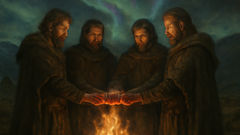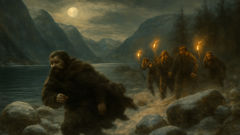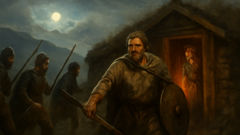Introduction
In the wild heart of medieval Iceland, where stone-strewn valleys met dark, restless fjords and frost-bound birches whispered in the night, a saga was forged in blood and loyalty. It was a land where honor was currency, fate was a shadow that stretched longer than any winter night, and kinship shaped the lives of men as surely as the relentless northern winds. Here, the story of Gisli Sursson took root—an epic of devotion and vengeance that would echo down generations, engraved in the oral memory of a people whose lives balanced on the sharp edge between survival and myth. Gisli was a man of rare principle, upright even in a world where one’s word could be as brittle as the ice on the Lögurinn. Raised among proud folk in Dýrafjörður, he grew under the stern eye of his father Sur, learning that life offered no favors to the weak. Yet for all his strength and resolve, Gisli’s destiny was never truly his own. Bound by oaths sworn in fire-lit halls, his fate became entangled with that of his sworn brother, Vestein—an alliance that would test the very limits of loyalty. When old grudges and hidden betrayals festered, tragedy struck, sending Gisli down a path from which there was no return. Hunted through birch forests and over bleak moors, Gisli would spend years as an outlaw, relying on guile and endurance to outlast his pursuers and protect those he loved. His tale is not just of blood and blades, but of the quiet moments: the comfort of home, the ache of loss, and the hope that justice might survive even in exile. The saga of Gisli Sursson stands as a mirror to the Icelandic soul, capturing all the turbulence, resilience, and fatalism that have shaped this land since the first settlers claimed it from the sea.
Oaths Forged in Fire: The Brothers Bound
In the years before outlawry, the valleys of Dýrafjörður pulsed with the daily toil of free farmers and proud housecarls. The Sursson homestead lay close by the swelling river, its turf walls blending seamlessly into the rolling earth, while smoke from the central hearth curled lazily through a roof vent. Here, Gisli grew with his brother Thorkel and his sisters, Sigrid and Thordis, their laughter and quarrels echoing through the longhouse as the seasons turned. Sur, their father, was a man of sharp words but sound judgment, teaching his children to measure their honor in deeds, not boasts.

Gisli’s closest bond, however, was not with his kin by blood, but with two men who would shape his fate—his brother-in-law Thorgrim and his sworn brother Vestein. In those days, the old custom of blood brotherhood was not entered lightly. On a night of feasting, as auroras danced above, Gisli, Thorkel, Thorgrim, and Vestein clasped arms and cut their palms, letting their blood mingle. Their oaths were spoken aloud, binding them to defend each other through misfortune or death. Yet even as they pledged their loyalty, cracks lay beneath the surface—seeds of jealousy, secret love, and ambition that would one day splinter their brotherhood.
As summers passed, prosperity filled the Sursson farm. Vestein, ever loyal and forthright, became Gisli’s closest confidant. The two hunted together through mountain passes, fished the silver rivers, and shared stories as snow drifted against the walls. Gisli’s sister Thordis grew restive in her marriage to Thorgrim, who watched Vestein with wary eyes. Rumors drifted on the wind—of slights, of hidden feelings, of old scores unsettled. Still, Gisli held fast to his oaths. He knew the cost of broken promises in a land where justice was personal and vengeance an expectation.
The storm broke one autumn night, when Vestein returned from abroad to visit Gisli’s home. In the darkness, as the family slept, an assassin crept into the longhouse and struck Vestein down with a spear. Blood pooled on the packed earth, and the walls echoed with Thordis’s keening. Grief twisted Gisli’s heart, but the oath he had sworn burned hotter than any sorrow. He suspected Thorgrim—cunning, ambitious, always resentful of Vestein’s place at Gisli’s side. Yet proof was elusive, and in this harsh world, justice had to be taken, not given. That winter, as snow lay heavy on the land and wolves prowled the ridges, Gisli weighed his next move. He gathered with trusted men, plotting quietly, keeping his suspicions close. When spring’s thaw finally loosened the rivers, Gisli struck. Under cover of night, he slipped into Thorgrim’s homestead. The fire was low; the house quiet. In a swift, silent moment, he avenged Vestein, ending Thorgrim’s life with a single thrust. The deed was done, the oath fulfilled—but at a terrible price. With Thorgrim’s kin baying for blood, Gisli was named outlaw, cast beyond the law’s protection. His family mourned the fate that had befallen them, but Gisli faced it with grim resolve. He would not beg forgiveness, nor yield to fate’s cruelty. Instead, he would vanish into the wilds, carrying the memory of his brother and the burden of loyalty that had shaped—and shattered—his world.
Exile Among Fjords: The Outlaw's Flight
Banished from home, Gisli became a wanderer in his own land. The law of Iceland was unforgiving—an outlaw could be killed on sight, his property seized, his kin endangered by his mere presence. The news of Thorgrim’s death spread swiftly, fanning the flames of vengeance among Thorgrim’s family and allies. Gisli’s wife, Aud, and his loyal supporters risked everything to shelter him, knowing that to do so was to invite ruin upon themselves.

For years, Gisli’s life became one of restless movement. By day he hid among the boulders or in secret dens hollowed from the hillsides; by night he traveled under the cover of darkness, guided by the pale glimmer of stars or the eerie glow of the aurora. He trusted few—only Aud, steadfast and unbreakable, and a handful of friends whose loyalty had not faltered. Sometimes he slept beneath a cloak of snow, sometimes in the smoky shadows of hidden turf-houses built for outlaws like himself. Each passing season brought new dangers: informers eager for silver, neighbors pressed by Thorgrim’s kinsmen to betray Gisli’s whereabouts, and the ever-present hunger that gnawed at a man hunted like a wolf.
Yet Gisli did not break. He sharpened his wits along with his blade. He became a master of disguise and subterfuge, moving between fjords and valleys with uncanny skill. Often he would appear at Aud’s homestead in the dead of night, sharing a whispered meal before vanishing at first light. The couple’s love endured despite hardship; Aud’s courage was a shield as much as any sword. She outwitted spies and carried messages through hostile territory, her resolve unwavering even as her husband’s fate grew darker.
It was not just hunger or cold that threatened Gisli. His dreams grew troubled—visions of Vestein, of blood pooling in the snow, of fate pursuing him in the form of a one-eyed woman who foretold doom. These night-terrors became companions as constant as the wind. Yet amid despair, moments of peace survived: a quiet dawn when ptarmigan called from frost-dusted heather; the warmth of a stolen hour by a fire with Aud; the rare laughter of an old friend who dared defy the edicts of men in favor of loyalty.
Gisli’s legend grew with each narrow escape. He outwitted those who hunted him, slipping away just as steel glinted in the grass or torches appeared on a ridge. The people of Iceland whispered of his endurance—the way he survived the harshest winter by fashioning shelter from driftwood and moss, how he won a contest of wits against a band of mercenaries sent to flush him out, and how his spirit never faltered. For Gisli, every day of survival was both victory and torment—a testament to love and loyalty, but also a relentless reminder that peace could never last so long as vengeance walked the earth.
The Last Stand: Justice at Saebol
Time passed, but Gisli’s pursuers did not relent. Thorgrim’s kinsman Bork, driven by pride and wounded honor, swore to see Gisli brought to justice—or, failing that, to death. Bork gathered men skilled in tracking and fighting, promising reward to any who aided in Gisli’s capture. The outlaw’s circle grew smaller as the years wore on; friends who had once defied the law now hesitated, fearing for their own families. Only Aud remained unshaken, her love shining like a beacon through Iceland’s relentless gloom.

The final chapter unfolded at Saebol, a remote farm where Aud had found shelter for herself and her fugitive husband. The farm was little more than a cluster of turf-walled buildings crouched beneath brooding hills, isolated but not beyond the reach of Bork’s men. Rumors drifted—of a stranger glimpsed in the woods, of firewood disappearing from stacks, of mysterious footprints in the snow. Bork’s spies grew bold, closing in on Gisli’s refuge.
On an autumn morning, as mist clung to the heather and ravens circled overhead, Bork’s band surrounded Saebol. They waited until nightfall, then crept toward the farmhouse with weapons drawn. Aud, always vigilant, roused Gisli as soon as she sensed danger. He had prepared for this moment: his sword sharpened, his mind steeled by years of hardship. Aud begged him to flee into the hills, but Gisli refused—he would not run while his wife’s safety hung in the balance.
The attackers stormed the house, axes crashing against the door. Gisli fought like a cornered wolf—swift, silent, implacable. He wounded several before they forced him into the open. Under the eerie light of a waxing moon, Gisli stood his ground on a narrow strip of frozen earth, back to the wall of the turf-house. Blood steamed in the cold air; the cries of battle mingled with the distant howling of wolves. Even as he was struck down by superior numbers, Gisli’s spirit did not break. He died as he had lived—defiant, loyal, and unbowed.
When the morning broke over Saebol, silence lay heavy on the land. Aud buried her husband with her own hands, refusing to let Bork’s men desecrate his body. Her grief was tempered by pride; she knew Gisli’s story would outlast his killers. Word spread quickly: the outlaw had fallen, but his courage and integrity were beyond reproach. In years to come, poets would chant his saga by hearth and in the halls of chieftains. His tale became a lesson for generations—of the price of loyalty, the cost of justice, and the enduring power of love even against fate itself.
Conclusion
So ended the saga of Gisli Sursson—neither villain nor martyr, but a man who walked the narrow path between justice and vengeance when fate left him no other choice. His story endured not only because of his feats but because it held a mirror to Iceland itself: a land where family and loyalty are tested by hardship, where honor sometimes demands impossible sacrifice, and where even in exile, hope finds a way to survive. The memory of Gisli’s courage lived on in the voices of storytellers and in the hearts of those who understood the true meaning of loyalty. To this day, his saga is told wherever fire crackles on a cold night and the wind rattles through stone and heather—a tale of a man whose strength was measured not just by his sword, but by the steadfast love he carried through every trial.


















